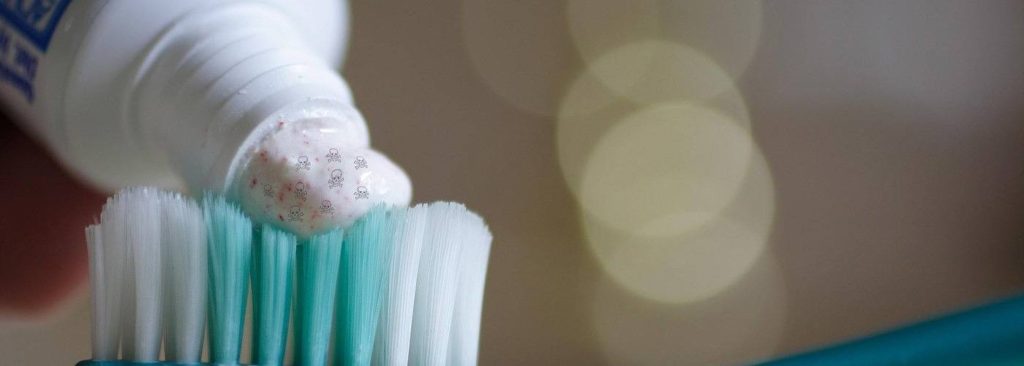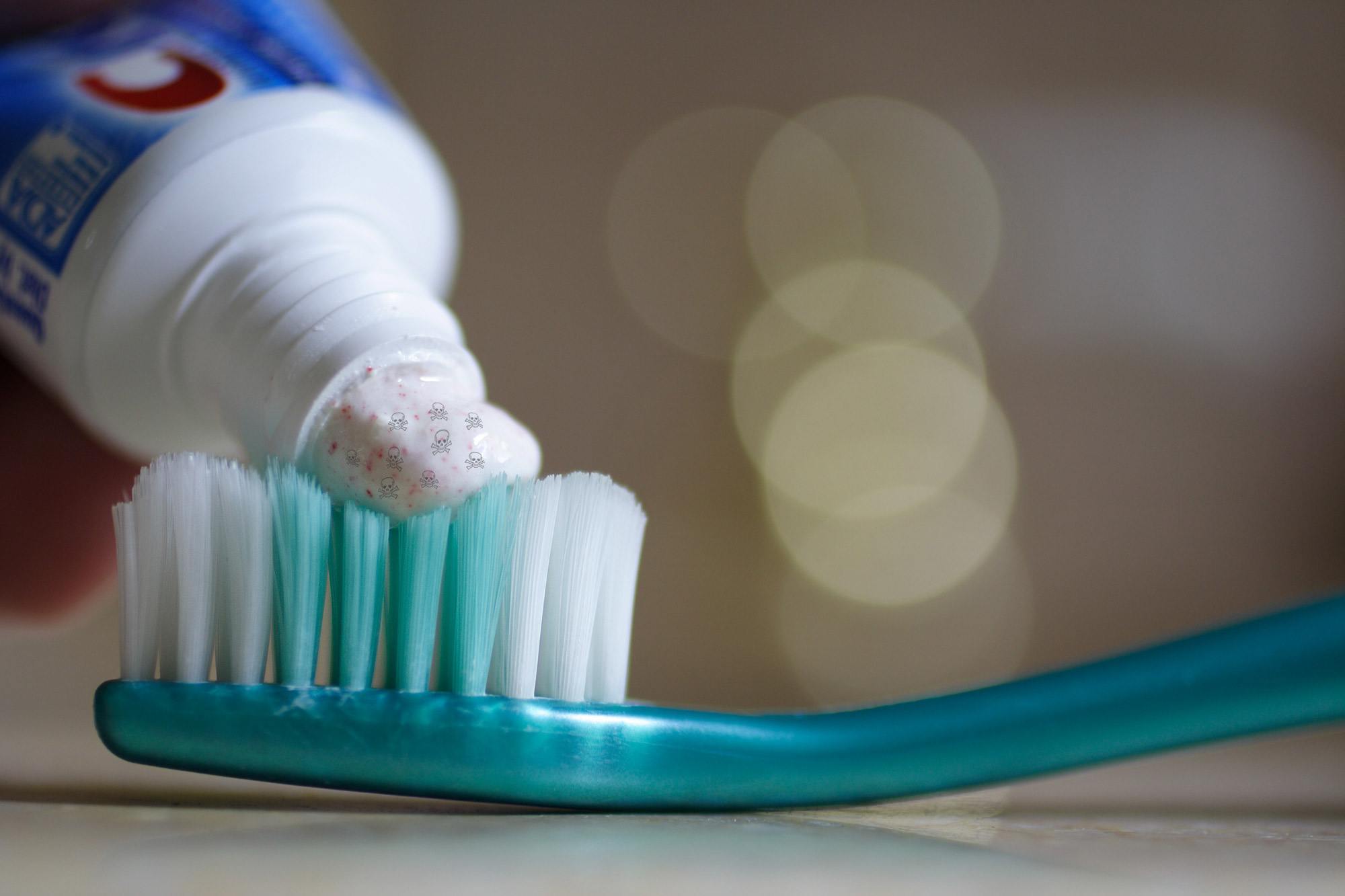
Conventional toothpaste is full of toxins that make your teeth look pretty and feel clean while they slowly erode the tooth enamel and gums. Conventional whitening toothpastes are very toxic to the mouth. All of the conventional brands and many of the “natural” brands put chemicals in their toothpaste that no one would never put in their body knowingly, except fluoride, a known carcinogen and neurotoxin that people have been brainwashed into believing is good for them.
If you’re shopping for an all-natural toothpaste, here is a list of ingredients to avoid, and why:
Triclosan
Triclosan is used in skin care products, deodorants, laundry detergents, mattresses, toilet fixtures, hand sanitizers, toothpaste, and more. This chemical has powerful antibacterial and antifungal properties, but it’s also been linked to numerous health problems. Triclosan impedes the thyroid gland, is likely an endocrine disruptor, and it may cause cancer. Triclosan is used in some of the most popular toothpastes.
Sodium Lauryl Sulfate
A common ingredient in toothpaste and another likely cancer contributor, sodium lauryl sulfate (SLS) is as a surfactant that helps thicken toothpaste and is responsible for its foaming action. SLS is said to help dissolve dental plaque. It is a known skin irritant, it pollutes our groundwater, it is toxic to fish and other aquatic animals, and it’s a pesticide and herbicide that is used to kill plants and insects.
The manufacturers of SLS recently petitioned to have the chemical listed as an approved pesticide for organic farming, but fortunately the application was denied because of its polluting properties and its ability to cause environmental damage. The manufacturing process is also highly polluting, with cancer-causing volatile organic compounds and sulfur compounds that get released into the environment.
There have been many studies showing that SLS may contribute to cancer, teeth and gum problems, ulcers, and many other health issues.
Aspartame, Saccharine
These are artificial sweeteners that often show up in toothpaste formulas and many sugar free foods. Each has been linked to many serious health problems and should be avoided altogether.
Fluoride
Fluoride is an endocrine disrupter that calcifies the penile gland and can reduce thyroid and adrenal gland function. Fluoride increases cancer risk, causes damage to DNA, inactivates enzymes within the body, accelerates aging, disrupts the immune system, and should be avoided both in toothpaste and in water.
There’s a lot of talk of Nazi Germany using fluoride to pacify the Jews, but I cannot verify this to be true. If you have a strong source on this, please leave us a comment and let us know.
Propylene Glycol
Propylene glycol is a form of mineral oil. It’s an alcohol that is produced by fermentation of yeast with certain carbohydrates.
Propylene glycol comes in several grades, and it has a variety of uses. The industrial grade is an active ingredient in engine coolants and antifreeze, airplane de-icers, paints, enamels, and varnishes. Propylene glycol in pharmaceutical grade form is used in many products, including toothpaste, as a solvent or surfactant.
Adequate testing has not been done with propylene glycol, but the EPA considers propylene glycol to be so dangerously toxic that it must be handled with gloves, protective clothing, goggles, and proper disposal. Truth be told, that’s true with most of the other chemicals in toothpastes and other body care products, and many ingredients in our foods. Obviously, if you want a healthy mouth, do not put chemicals on your toothbrush. They virtually always prove to be problematic in the long run.
Glycerin
In itself, glycerin is not toxic. The problem is that glycerin, when scrubbed onto the surface of teeth, leaves a residue that is hard to remove. You can rinse your mouth two to three dozen times to remove it.
Calcium and phosphorus, minerals the teeth need which are normally present in our saliva, continually flow through our teeth. Glycerin residue prevents this natural flow, the natural demineralization and remineralization process. This accelerates tooth decay and other dental problems.
Diethanolamine
Diethanolamine (DEA), is in products that foam like toothpaste. DEA disrupts hormones and forms cancer-causing nitrates. Dr. Samuel Epstein, professor of environmental health at University of Illinois, states that repeated exposure to skin may lead to increased risk of liver and kidney cancers.
Sorbitol
Sorbitol is used as a thickener and a humectant to prevent toothpaste from hardening when the tube is opened or when the toothpaste is exposed to air. Sorbitol is a sugar alcohol (similar to xylitol) used to sweeten some “health food” products. Some researchers have recently discovered that sorbitol found in chewing gum can cause chronic diarrhea. Very little research has been done on this chemical.
Microbeads
If polypropylene, poly-e-terephthalate, and polymethyl methacrylate are tiny pieces of plastic that are included in toothpaste as an abrasive. While these little plastic beads may help scrub plaque off your teeth, they also damage tooth enamel and become lodged in sensitive gum tissue. To make matters worse, they absorb both bacteria and industrial chemicals and are believed to be endocrine disrupters.
Conclusion
Don’t buy the brands with the aforementioned ingredients. A brand with any of the ingredients listed should not be a brand you trust.
In conclusion, while toothpaste is an essential part of our daily routine, it is important to be aware of the harmful chemicals it may contain. Choose natural, SLS-free toothpastes, pay attention to the color codes, and look for the ADA seal to ensure you are using a safe and effective product for your oral health.
Try this all-natural Toothpaste; you may find you love it like many others have.
If you have questions, you can contact me directly through Facebook Messenger here m.me/georgerobinson02
